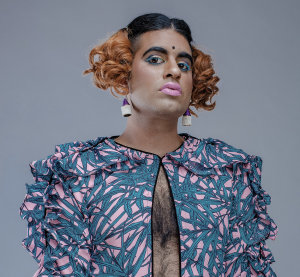Identity
Sorry, Demi Lovato: You Can't Fight Sexism by Opting Out of Womanhood
It’s true that hair is a definitive socially-constructed characteristic of femininity (and masculinity) in many cultures.

In the first episode of her new podcast, 4D, actress and singer Demi Lovato announced that she now identifies as “non-binary,” and that she would be “changing my pronouns to they/them.” In a half-hour interview with guest Alok Vaid-Menon, a non-binary influencer best known for an apparent inability to get a date, Lovato reflects on what identifying as non-binary means. “I feel that this best represents the fluidity I feel in my gender expression,” Lovato said, “and allows me to feel most authentic and true to the person I both know I am, and still am discovering.”

Lovato is the latest celebrity to jump on the non-binary trend. Last year, Juno star Elliot Page (née Ellen Page) announced a new identity as transgender and non-binary—this after coming out as a lesbian in 2014. Courtney Stodden, a reality TV star who rose to fame following a marriage to an actor three times older, announced a new non-binary identity on Instagram in April. Singer Sam Smith began identifying as non-binary in 2019. Lovato says that her friendship with Smith helped inspire her own “revelation.”
According to the Human Rights Campaign, a non-binary person is someone “who does not identify exclusively as a man or a woman.” Speaking to Lovato, Vaid-Menon took the definition a step further by removing the idea of self-identification entirely, stating simply that “non-binary means that you are not exclusively a man nor a woman” (my emphasis).
Non-binary identities have been on the rise for at least a decade, and have become especially popular among young LGB women. A 2019 study of “LGBTQ” teens done in collaboration with the Human Rights Campaign found that girls were over seven times more likely than boys to identify as non-binary; and that, of these girls, over 70 percent were lesbian or bisexual.
When young women adopt a non-binary label, it often comes with public expressions of relief that they no longer feel pressured to conform to gender norms. From what I have observed personally, these women also are disproportionately likely to be survivors of male violence, sexual trauma, and serious mental health issues.
In 2019, I wrote about my three roommates who, over the course of a single year, all began to identify as non-binary. Ranging in age from 19 to 23, they were bisexual (or what they call “queer”) women with histories of sexual violence, body-image issues, and a tendency toward drug abuse. They each struggled with the expectations society placed on them as women; and, like most women I know, felt confined by the stereotypes of femininity. For two of them, the journey toward identifying as non-binary began with a simple act of rebellion: cutting their hair.
When describing the motivations behind her new identity, Lovato ticks off many of these patterns. The singer and former Disney child star has been open about her struggles with depression, anxiety, body image, bulimia, addiction, and self-harm. In 2018, she suffered a near-fatal overdose that still impacts her physically. Lovato now blames that overdose on the pressure she felt to be feminine.
“I feel like the reason that happened was because I was ignoring my truth and I was suppressing who I really am in order to appease stylists, team members, or even fans who wanted me to be the sexy, feminine, pop star in the leotard and look a certain way,” she said. “I thought that’s what I was supposed to be.”
Lovato added that the identity switch also was related to her experiences of sexual trauma and struggles with sexual orientation. Embracing her masculine side, she believes, has helped her be less afraid of “specific genders that caused pain on me.”
It’s clear from listening to Lovato that her life has been deeply shaped, often in negative ways, by her experiences as a woman in a patriarchal society. The expectation that women, especially those in the public eye, must be skinny, sexy, and feminine is imposed aggressively on many girls from a young age, often under threat of male violence. Gender-nonconforming women (and men), regardless of what pronouns they prefer, often become targets. And breaking down gender roles, as Lovato says she wants to do, is a core tenet of mainstream feminism. But in her purported attempt to subvert gender roles, Lovato is only cementing them further.

Although Vaid-Menon goes to great lengths to claim that one’s gender identity is unrelated to appearances, or to stereotypes of masculinity and femininity, this claim contradicts everything else the pair relate about their own experiences. Vaid-Menon, for his part, describes the devastation of being told as a child, “You can’t dance, only girls do that.” At one point, Vaid-Menon also suggests he must not be male since he likes ballet—a claim fully consistent with the most regressive and rigid kind of sex stereotypes. He also argues that “living under the gender binary is painful for everyone”—a point I happen to agree with. But Vaid-Menon fails to explain how those who identify as non-binary are harmed by gender roles in ways that those who accept the reality of biological sexual dimorphism aren’t.
For Lovato, as with my roommates, a lot of it comes down to hair. “I’ve been myself ever since I cut my hair off,” she said. “I wanted to say, back when I cut my hair off, I’m cutting my hair off because for so many years I’ve been the femme-presenting woman that everyone sees me as—the Disney pop star. Me cutting my hair off was years of gender conforming, years of stereotypes that I was trying to fit into in order to gain validation.”
It’s true that hair is a definitive socially-constructed characteristic of femininity (and masculinity) in many cultures. Indeed, androgynously-shaped cartoon characters in kid’s television programs tend to be easily identified as male or female based on the length of their hair. Shaved or short hair among women is seen as a symbol of abandoning traditional man-pleasing femininity, and has long been associated with lesbianism (or, in the case of pop stars, a mental breakdown). In South Korea, young radical feminists have begun shaving their heads in public ceremonies as an act of defiance against patriarchal stereotypes. These feminists demonstrate what so many women, including Lovato, seem to have forgotten—that women can rebel against gendered expectations without “forgoing” womanhood.
For Lovato and many other young people who crave external validation, living “authentically”—which includes not being held back by gender roles—apparently becomes possible only once they take on an identity that justifies this transgression. Being a woman with short hair, or opting to not perform every aspect of femininity on any given day, apparently was impossible for Lovato until she became part man.
In describing her new non-binary life, Lovato tells listeners, “I wear what I want. I wear makeup some days and I don’t wear makeup other days. Sometimes, you can’t tell what I’m presenting as. I’m so free now.” The implication is that when she was just a boring old woman, full stop, all of this would have been impossible—which obviously isn’t true (nor should it be true), as billions of girls and women around the world can attest.
Some self-described non-binary women say they’ve found what they perceive as an “escape hatch” from oppressive gender norms. As Lovato sees it, her new label is a form of “healing.” Criticizing this sort of thing is taboo, as no one wants to oppose “escape” or “healing.” But the awkward truth is that nothing described by Lovato, Page, Stodden, or any of the other young (biological) women who’ve chosen different forms of self-identification marks them as different: Few women (and none that I happen to know) are fully comfortable with the stereotypes and expectations that society places on female people.

The most logical way of fighting back is to point out that these stereotypes and expectations are misguided and unhealthy. To instead simply flee the category of woman through a trick of language, on the other hand, isn’t really brave or progressive. Lovato and all the other non-binary-identified women are simply throwing the rest of us under the bus by validating the idea that being a woman requires you to be comfortable with feminine stereotypes. In doing so, they unwittingly contribute to the real sources of female oppression.
From her mansion high in the Hollywood hills, Lovato may have forgotten what it’s like for women in her home state of Texas, where Governor Greg Abbott has signed one of the strictest anti-abortion laws in the country. The law, which will have devastating consequences for females (regardless of their identity), was signed on May 19th, the same day Demi Lovato announced she was “neither male nor female.” Women without her resources may find it a bit harder to opt out of the female category (especially if they are pregnant). According to the United Nations, 75 percent of women in Samoa experience physical or sexual abuse. Every single day, more than 200 women are killed by members of their own family or intimate partners. As of 2016, at least 200 million women and girls across the globe had experienced female genital mutilation, including half of all girls under the age of 12 in Indonesia. As it turns out, the patriarchy generally doesn’t care about your labels.
Giving lip service to someone’s self-conceived identity would appear to be the polite thing to do, so long as no one gets hurt. But while many women who identify as non-binary change little besides their hair cut and pronouns, there’s some evidence that a growing portion of this cohort are opting for gender “nullification” surgeries and hormones in an attempt to appear more androgynous. Page, for example, has undergone a cosmetic double-mastectomy (euphemistically referred to as “top surgery”). At least one of my three roommates who identified as non-binary in 2018 has since started taking injections of testosterone to appear more masculine.
I’m sympathetic to the pain that women such as Lovato have experienced as they’ve sought to live “authentically” in a society that wants to put people, especially women, into pre-defined boxes. Although I certainly can’t speak to life as a celebrity, Lovato and I actually have some things in common. Like her, I survived sexual trauma, battled mental illness, and self-harm in my teenage years, struggled to come to terms with my bisexuality, and felt trapped by gender norms. Where we differ is in our vision for a better future. Feminism fights for a world in which no woman or girl will be oppressed or subjected to violence on the basis of her sex. Behind the rise of non-binary identities, on the other hand, is the hope that no one will be forced, because of their sex, to be a woman. Being a woman is perceived to be the problem itself, rather than the cultural stereotypes and pressures applied to women.
This is internalized misogyny, in other words—the inherent acceptance of the paradigm that created “woman” as “feminine,” and “feminine” as “lesser,” in the first place. This is why “non-binary” women will ultimately end up disappointed. While changing your pronouns and hair may feel like a solution, it’s just a superficial fix that forestalls the hard work of coming to terms with the reality of being female. There, Demi, is where true healing and authenticity lies.






